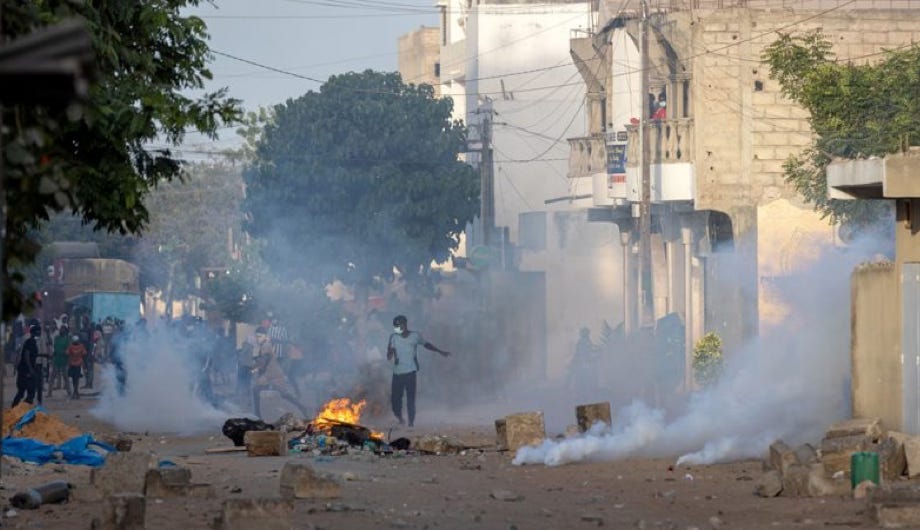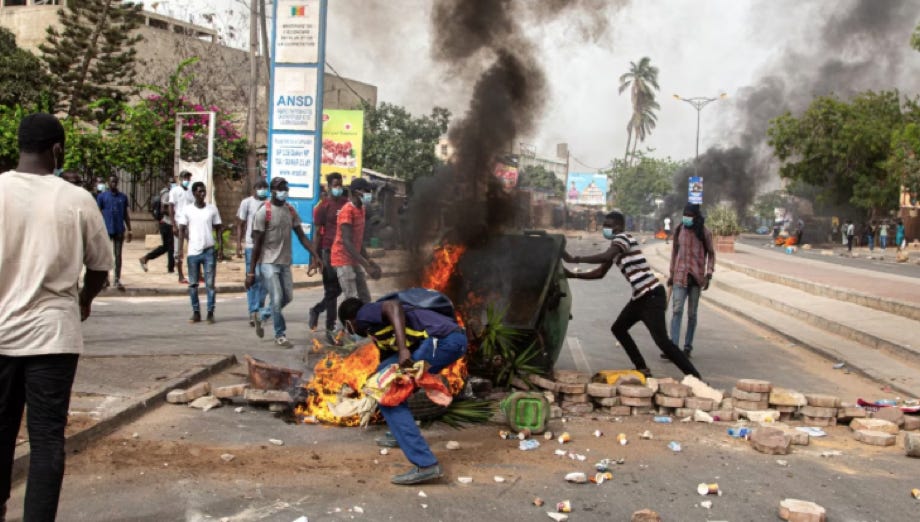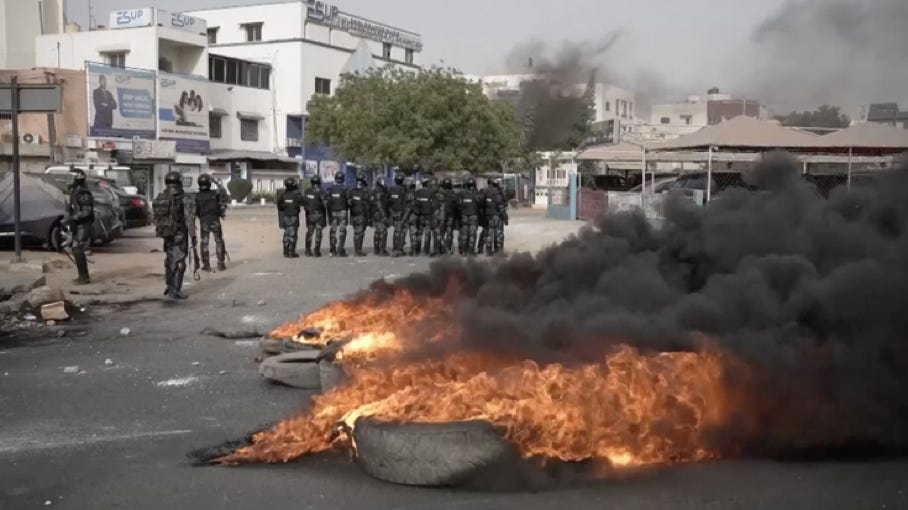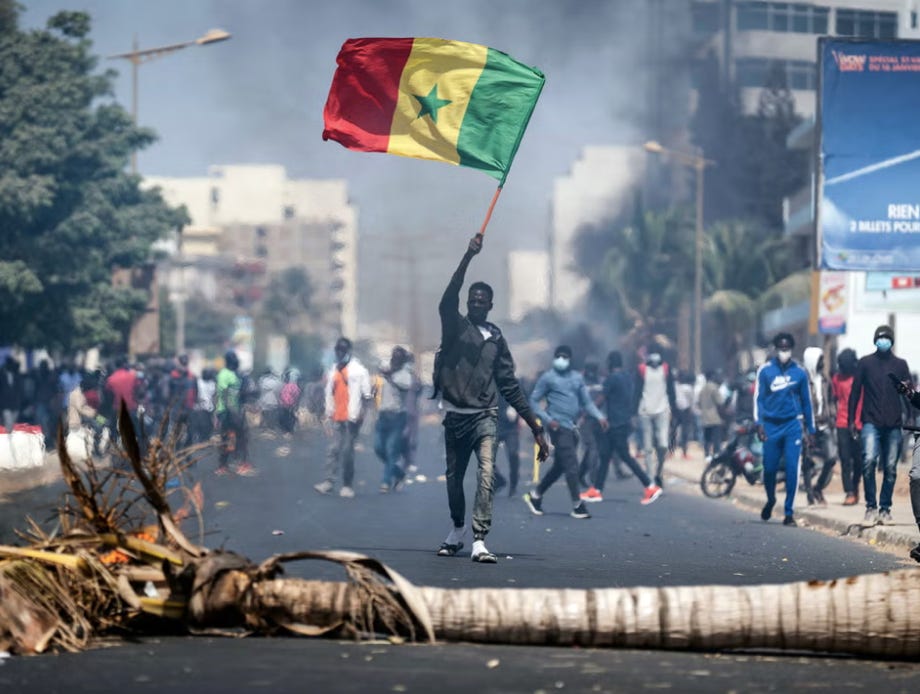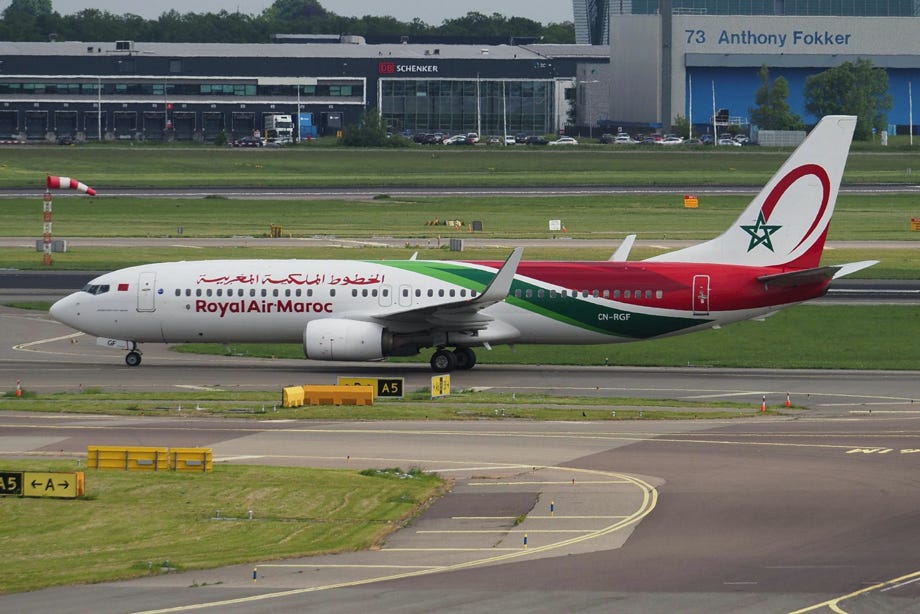
There are none of my own photos included in today’s diary, but if you have read yesterday’s diary you will understand the reason.
My original plan for today was to take the short ferry trip to Île de Gorée, an important historical location because of its past role as an element of the infamous Atlantic slave trade. It was so close to Dakar that I could see it (well, half of it) from the room of my hotel.
However, my experiences today took quite quite a different pathway. As I was scheduled to leave Senegal tonight (or more accurately at 2:30am tomorrow morning), I needed to complete several official tasks to follow up yesterday’s incident.
I began the day by booking a car to take me to the airport tonight, leaving the hotel at 10:30pm. As I did so, I asked where I might be able to buy a cable to recharge the battery of my watch, as the cable had been in the backpack that was stolen and my watch would soon be useless with a flat battery. The hotel staff kindly offered to send someone to the market to buy a cable for me, hoping to have it ready for me by the time I finished my breakfast. And they did! I was deeply impressed.
They also suggested that I needed to get a police report on the previous day’s incident, and they even suggested that one of their staff accompany me to the police station to translate if I could wait until 11:00am. I gratefully accepted the offer, and in the time I had before 11:00am I washed clothes (to use Dakar’s quick drying heat) and visited the Hertz office to pick up the written report (and, as things turned out, watch it being prepared first).
Shortly after 11:00am, Albain from the Pullman Hotel and I walked to the Police Station just a few blocks north-west from my hotel. The building was just like I was expecting – a bleak, decaying, dark, sombre French colonial building that would be brilliant as a movie set.
Albain escorted me to the Senior Investigator’s PA’s office. The PA explained that in order to see the Investigating Officer, a formal written letter of request was required, so Albain wrote a one page detailed letter in French. When he checked it with me, one significant detail was incorrect (the location of the attack), so the entire letter had to be re-written as corrections were not acceptable.
Once completed (for the second time) the letter was presented to the PA, who took it away to show the Chief Investigator. About ten minutes later she returned with a small slip of paper confirming the Chief Investigator had agreed to a meeting the following Monday. Of course, such timing was a problem as I was due to leave Senegal that evening. The (temporary) solution was that I write a detailed formal letter (duly signed, dated and stamped) granting Albain Power of Attorney to act on my behalf to follow up this matter with the Police. Hopefully a police report will emerge in due course. (Post note: Monday’s meeting was postponed by the Police due to “more pressing issues in the country”, re-scheduled to the following Monday).
The rest of today was spent deliberately trying to relax before the evening’s overnight flight, catching up on e-mails using the hotel’s public computer – an ancient iMac using an almost (but not quite) useless archaic version of Internet Explorer as its sole interface – a browser that proved to be incompatible with G-mail (except in its stripped down version), iCloud and Google Maps (and no doubt much more).
After attending to my 70 or so e-mails I relaxed watching TV coverage of the riots that were apparently across the city around me – quite a disincentive to go out walking, especially when I looked down from the window of my hotel room and saw trucks passing by with armed, camouflaged soldiers sitting in the back. For the record, “armed” in this context invariably meant matte-black semi-automatic machine guns.
I received two phone calls from the car company driving me to the airport (as well as a lovely phone call from my wonderful, concerned, caring daughter). The first call was to confirm the time of departure (10:30pm) with the comment “that will probably be okay”. (My flight was due to depart at 2:30am and the airline’s advice was to arrive at least three hours before departure time).
The second call came at 10:00pm to say the driver had arrived and we should leave right away as he wanted to allow enough time “in case of traffic congestion”.
Check-out from the hotel was quick and efficient. My driver was waiting in the car park outside, but I was instructed to stay inside and wait for him to come in and collect me. I was far from reassured when one of the hotel staff told me authoritatively that there was no point going to the airport as all flights had been cancelled, the airport was closed, and the road to the airport was blocked due to the riots. This was not reassuring!
I felt I had to try and get to the airport; it seemed silly not to do so when the airline hadn’t contacted me about a cancellation – although of course that could be explained by my having no phone, no iPad and no laptop. The driver seemed okay, so we did depart from the hotel, although I emphasised to the driver that all the doors of the vehicle should be locked.
There were a few other cars on the roads, which was encouraging, but there was also a huge presence of armed soldiers, armoured personnel carriers and other military vehicles – which was simultaneously both discouraging and encouraging.
What I found especially disturbing was the widespread evidence of the day’s riots – overhead advertising banners ripped to shreds and blowing upside down in the wind, lines of ashes across the road where fires had blocked traffic (for reasons I now understood), large blocks of wood on the dimly lit road to cause punctures (or worse), and so on.
As we approached the airport perimeter, we (like every vehicle) were stopped by machine-gun bearing gendarmes who checked the vehicle and its occupants. I was, however, encouraged to see that cars were being allowed to enter the airport precinct – certainly a good sign.
The airport was open, well-lit, bustling, busy and crowded. There was no sign that any flight had been cancelled. I started to relax when I saw all the people and activity, grateful that I had not taken the advice of the hotel employee to remain at the hotel. I had arrived more than three and a half hours before the departure time of my flight, and already there were a couple of hundred people already lined up to check-in for the flight.
I had to take two flights to reach London, both on Royal Air Maroc. Each was scheduled to take about three hours, and there would be a six hour transit stop in Casablanca between them.
The first flight from Dakar to Casablanca (AT500) was on a Boeing 787-8, registration CN-RGT. I had a huge feeling of relief as the plane took to the sky. Being a fairly clear night, it was easy to see the lights of Dakar as we took off, noting that there were no raging fires visible at 2:30am, and soon the urban lights showing the distinctive morphological patterns of Kayar and Saint-Louis as we flew over them.
After we crossed the border into Mauritanian airspace, the black void of the Sahara Desert dominated the views (or lack of views) with the somewhat spectacular exception of the lights of Nouakchott, Mauritania’s capital city.
The second flight, which was from Casablanca to London’s Gatwick Airport (AT802) was on a Boeing 737-800, registration CN-RGF. This flight was scheduled to depart at 12:10pm (on Saturday 3rd June) and land at 3:20pm. All but two passengers were on board by 12:20pm, but by then we had lost our allocated arrival slot at Gatwick so we sat in the plane, parked at a remote stand with the engines not started for an hour and a half.
Eventually the plane took off, and I enjoyed beautifully clear views of the region around Casablanca as we climbed, followed by wonderful views a little later of Rabat (Morocco’s capital city) – views that were eminently photo-worthy for anyone with a camera or other means to record them. I farewelled Africa as we crossed the Strait of Gibraltar from Tangier, being welcomed to Europe a minute later by clear views of Gibraltar itself.
I landed at Gatwick an hour late to discover there was a train strike, and the only way to get information about alternative transport was to use the QR codes provided on the signs (there being no information desk in the arrivals area). That, of course, presumed that arriving passengers had a mobile phone, which I didn’t, leading to another long, uncomfortable and expensive adventure.
But that’s a story for another day.

